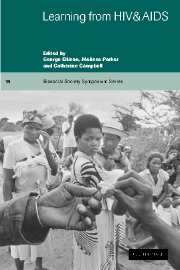Book contents
- Frontmatter
- Contents
- List of contributors
- Foreword by D. Clarke-Patel
- 1 Introduction. Learning from HIV and AIDS: from multidisciplinary to interdisciplinarity
- 2 HIV and the evolution of infectious diseases
- 3 The epidemiology of HIV/AIDS: contributions to infectious disease epidemiology
- 4 The influence of HIV/AIDS on demography and demographic research
- 5 What have clinicians learnt from working with HIV/AIDS? A medical perspective from London
- 6 How has the HIV/AIDS pandemic contributed to our understanding of behaviour change and health promotion?
- 7 Anthropological reflections on HIV prevention strategies: the case for targeting London's backrooms
- 8 An absence of anthropology: critical reflections on anthropology and AIDS policy and practice in Africa
- 9 A disaster with no name: the HIV/AIDS pandemic and the limits of governance
- 10 Postscript: reflections on HIV/AIDS and history
- Country index
- Subject index
- References
9 - A disaster with no name: the HIV/AIDS pandemic and the limits of governance
Published online by Cambridge University Press: 14 January 2010
- Frontmatter
- Contents
- List of contributors
- Foreword by D. Clarke-Patel
- 1 Introduction. Learning from HIV and AIDS: from multidisciplinary to interdisciplinarity
- 2 HIV and the evolution of infectious diseases
- 3 The epidemiology of HIV/AIDS: contributions to infectious disease epidemiology
- 4 The influence of HIV/AIDS on demography and demographic research
- 5 What have clinicians learnt from working with HIV/AIDS? A medical perspective from London
- 6 How has the HIV/AIDS pandemic contributed to our understanding of behaviour change and health promotion?
- 7 Anthropological reflections on HIV prevention strategies: the case for targeting London's backrooms
- 8 An absence of anthropology: critical reflections on anthropology and AIDS policy and practice in Africa
- 9 A disaster with no name: the HIV/AIDS pandemic and the limits of governance
- 10 Postscript: reflections on HIV/AIDS and history
- Country index
- Subject index
- References
Summary
In the end, everyone agreed that they should do one thing: Wait and see what happens. The situation would clarify itself and then they would move.
Randy Shilts, commenting on the United States' Government's debate on how to respond to AIDS at the end of 1982.So here I am, in the middle way, having had twenty years, twenty years largely wasted …
TS Eliot, The Four Quartets.This is a very, very different crisis than anything we've seen before.
James Morris, Executive Director of the World Food Programme, in Southern Africa, September 2002.Introduction
For more than a decade, for those who cared to look, it has been clear that the HIV/AIDS pandemic would inevitably cause major problems for African governance. The loss of human resources in the institutions of government, the private sector and civil society, would inexorably cause grievous economic harm, famine, declining governance capacity and risks to peace and security. To date, almost nothing has been done to address this imminent crisis. This chapter is concerned with some of the reasons for this, and what they tell us about the nature of African governance and international public policy.
Among myriad examples of lack of pace in responding to the implications of HIV/AIDS, let us select just two. The first indications of a major negative impact of the pandemic on an agrarian economy emerged in the mid-1980s, and the first studies were completed a few years later.
- Type
- Chapter
- Information
- Learning from HIV and AIDS , pp. 238 - 267Publisher: Cambridge University PressPrint publication year: 2003
References
- 10
- Cited by

